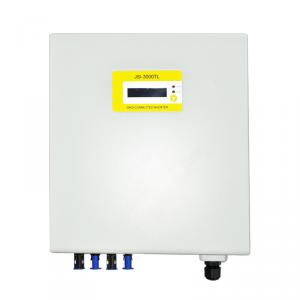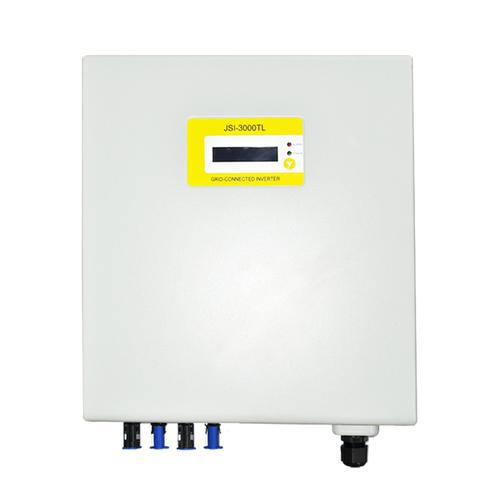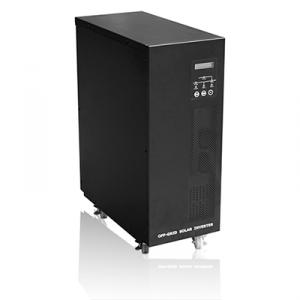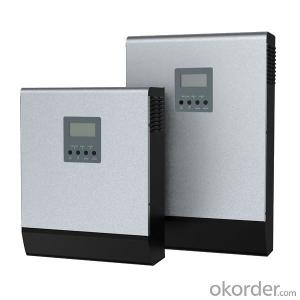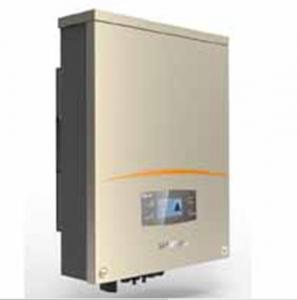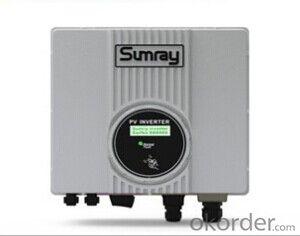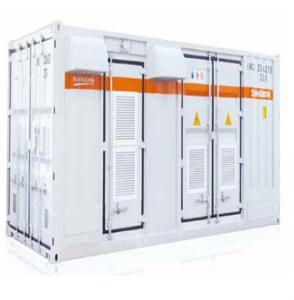Eg4 Solar Inverter 6000W Grid Connected Solar PV Inverter
OKorder Service Pledge
Quality Product, Order Online Tracking, Timely Delivery
OKorder Financial Service
Credit Rating, Credit Services, Credit Purchasing
You Might Also Like
Grid connected solar PV inverter 6000W
◆ Compact size and high power density
◆ High speed MPPT for real time power tracking and improved energy harvesting
◆ Transformerless operation for highest efficiency 97%
◆ High overload capability under most ambient conditions
◆ Certified grid connected operation according to the international standards
◆ True sine wave output
◆ Integrated RS485/RS232 serial communications
◆ Multi-language LCD display
| MODEL | 1100TL | 1500TL | 2000TL | 2500TL | 3000TL | 3600TL | 5000TL | 6000TL |
| Max. DC Input Power(W) | 1200 | 1750 | 2300 | 2700 | 3660 | 3750 | 5300 | 6400 |
| Max DC Voltage(Vdc) | 450 | 450 | 500 | 550 | ||||
| MPPT Operating Range(Vdc) | 60~450 | 100~450 | 100~500 | |||||
| Number of Parallel Inputs | 1 | 2 | 3 | |||||
| Number of MPPT Trackers | 1 | |||||||
| Max. Input Current(A) | 11.7 | 10 | 13 | 14.5 | 20 | 20 | 22.5 | 27.5 |
| Nominal Output Power(W) | 1100 | 1500 | 2000 | 2490 | 3000 | 3600 | 4600 | 6000 |
| Max. Output Power(W) | 1100 | 1650 | 2200 | 2490 | 3400 | 3600 | 5000 | 6000 |
| Nominal Output Current(A) | 4.8 | 6.5 | 8.7 | 10.8 | 13 | 15.7 | 20 | 26 |
| Max. Output Current(A) | 5.7 | 7.9 | 10.5 | 12 | 15.7 | 16 | 24 | 29.3 |
| Nominal AC Output Voltage(Vac) | 230 | |||||||
| AC Output voltage range (Vac)* | 190~265 | |||||||
| AC Grid frequency range (Hz)* | 50±5 | |||||||
| Power Factor (cosφ) | >0.99 | |||||||
| THDI | <3%(at nominal output power) | |||||||
| Max.efficiency | 96.50% | 96.50% | 97.00% | 97.10% | 97.20% | 97.30% | 97.40% | 97.40% |
| Euro.efficiency | 95.40% | 95.50% | 96.20% | 96.30% | 96.40% | 96.60% | 96.80% | 96.80% |
| MPPT. efficiency | 99.60% | 99.60% | 99.60% | 99.60% | 99.60% | 99.60% | 99.60% | 99.60% |
| Operating Temperature(℃) | -25~+60 | |||||||
| Noise typical[dB(A)] | ≤20dB(A) | |||||||
| Operating Consumption(W) | 0 | |||||||
| Electrical Isolation | Transformerless | |||||||
| Cooling Concept | Natural cooling | |||||||
| Protect Level | IP65 | |||||||
| Communication | RS232(WiFi optional) | |||||||
| Dimension (W×D×H)(mm) | 345*152*315 | 345*152*355 | 345*152*385 | 345*152*505 | 345*162*573 | |||
| Weight (Kg) | 12 | 13 | 15 | 19 | 24 | |||
| *AC grid voltage range and frequency range depend on local standards | ||||||||
- Q: How does a solar inverter handle voltage drop?
- A solar inverter is designed to handle voltage drop by continuously monitoring the voltage level of the solar panels. If the voltage drops below a certain threshold, the inverter adjusts its internal electronics to compensate for the drop and ensure a consistent output voltage. This allows the inverter to maintain optimal performance and efficiency even in situations with voltage fluctuations or drops.
- Q: What is the role of a solar inverter in voltage support?
- The role of a solar inverter in voltage support is to convert the direct current (DC) power generated by solar panels into alternating current (AC) power that can be used to support the voltage requirements of electrical devices and the overall electrical grid. The inverter ensures that the AC power produced by solar panels matches the voltage and frequency requirements of the electrical system, thereby providing stable and reliable power supply.
- Q: Can a solar inverter be used in a solar-powered street lighting system?
- Yes, a solar inverter can be used in a solar-powered street lighting system. A solar inverter is responsible for converting the direct current (DC) produced by solar panels into alternating current (AC) that can be used to power the street lights. Therefore, it plays a vital role in ensuring that solar energy is efficiently utilized in the lighting system.
- Q: What is the role of a solar inverter in a community solar project?
- The role of a solar inverter in a community solar project is to convert the direct current (DC) electricity generated by the solar panels into alternating current (AC) electricity that can be used by the community. It ensures that the electricity produced is compatible with the electrical grid and can be distributed to homes and businesses. Additionally, the inverter helps to monitor and optimize the performance of the solar power system, maximizing energy production and efficiency.
- Q: What is the role of a solar inverter in a solar-powered electric vehicle charging station?
- The role of a solar inverter in a solar-powered electric vehicle charging station is to convert the direct current (DC) produced by the solar panels into alternating current (AC) that can be used to charge electric vehicles. The inverter ensures that the electricity generated by the solar panels is compatible with the charging station and the electric vehicle's charging requirements.
- Q: Are there any ongoing maintenance requirements for a solar inverter?
- Yes, there are ongoing maintenance requirements for a solar inverter. Regular cleaning of the solar panels to remove dust and debris is necessary to maintain optimal performance. Additionally, inspections and tests of the inverter's components, such as cables and connections, should be conducted periodically to ensure everything is functioning properly. Monitoring the inverter's performance and addressing any issues promptly is also crucial for long-term maintenance.
- Q: Can a solar inverter be used for commercial applications?
- Yes, a solar inverter can be used for commercial applications. Solar inverters are an essential component of commercial solar power systems, as they convert the direct current (DC) electricity generated by solar panels into alternating current (AC) electricity that can be used to power commercial buildings and equipment.
- Q: What are the main components of a solar inverter?
- The main components of a solar inverter typically include the DC input, MPPT (Maximum Power Point Tracking) system, inverter circuit, transformer, and AC output.
- Q: What are the common issues and troubleshooting steps for a solar inverter?
- Common issues with solar inverters can include issues with the inverter not turning on, no power output, low power output, intermittent power output, or error messages displayed on the inverter. Here are some troubleshooting steps to address these issues: 1. Check the power supply: Make sure that the inverter is properly connected to the power source and that there is no issue with the electrical supply. Check the circuit breaker or fuse box to ensure it has not tripped. 2. Inspect the wiring: Examine the wiring connections to ensure they are secure and not damaged. Loose or disconnected wires can cause power issues. If any damage is found, consider contacting a professional electrician to repair or replace them. 3. Clean solar panels: Dust, debris, or shading on solar panels can reduce the power output. Clean the panels using a soft cloth or a hose. If there is shading from nearby trees or structures, consider trimming or removing them if possible. 4. Check for error messages: If the inverter displays an error message, refer to the user manual or manufacturer's website for the meaning of the error code and recommended troubleshooting steps. If necessary, contact the manufacturer's customer support for further assistance. 5. Monitor the weather conditions: Solar inverters may have reduced power output during cloudy or overcast days. However, if the power output is consistently low even in optimal weather conditions, there may be an issue with the inverter itself. 6. Reset the inverter: Some inverters have a reset button or option. Try resetting the inverter to its factory settings, but keep in mind that doing so may erase any customized settings or configurations. 7. Firmware updates: Check if there are any available firmware updates for your specific inverter model. Updating the firmware can sometimes resolve issues and improve performance. 8. Consult a professional: If the troubleshooting steps above do not resolve the issue, it is recommended to contact a professional solar installer or electrician. They have the expertise and equipment to diagnose and repair more complex issues with solar inverters. Remember, safety should always be a priority when troubleshooting electrical equipment. If you are unsure or uncomfortable with any troubleshooting steps, it is best to seek professional assistance to avoid any potential hazards.
- Q: How does a solar inverter handle voltage stability in the grid?
- A solar inverter manages voltage stability in the grid by regulating the voltage levels of the electricity generated from the solar panels. It ensures that the voltage produced by the solar panels matches the voltage required by the grid, thus maintaining a stable and consistent voltage throughout the system. Additionally, solar inverters may also have features like reactive power control and voltage regulation capabilities, which further contribute to maintaining voltage stability in the grid.
Send your message to us
Eg4 Solar Inverter 6000W Grid Connected Solar PV Inverter
OKorder Service Pledge
Quality Product, Order Online Tracking, Timely Delivery
OKorder Financial Service
Credit Rating, Credit Services, Credit Purchasing
Similar products
Hot products
Hot Searches
Related keywords
